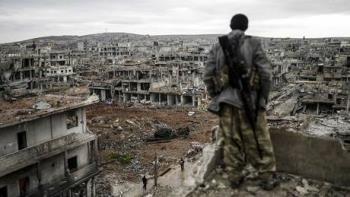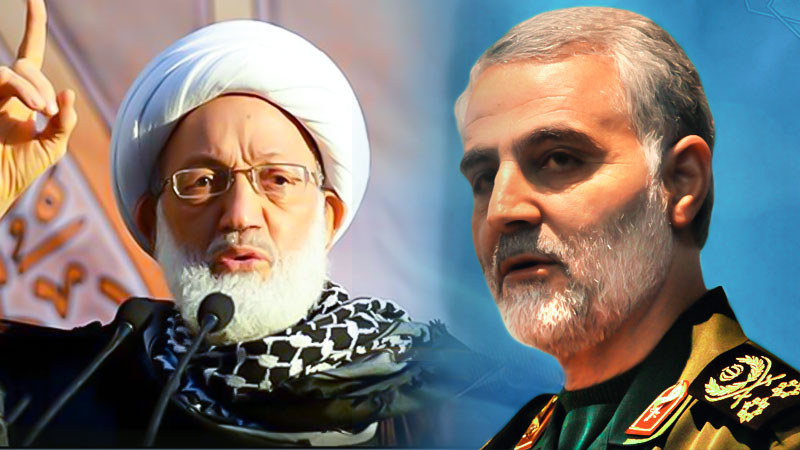Alwaght- A senior Iranian commander says the Bahraini regime has crossed the red line by revoking citizenship of Ayatollah Isa Qassim adding that masses are left with no option but armed resistance.
Major General Qassim Soleimani, commander of Iran’s Islamic Revolution Guards Corps (IRGC) Quds Force, said on Monday that overstepping this red line would “leave the people [of Bahrain] with no other choice but armed resistance.”
The Bahraini regime on Monday revoked the citizenship of Ayatollah Isa Ahmed Qassim, claiming that he has been involved in spreading extremism.
“Definitely, Al Khalifa will pay the price for this and it will result in nothing other than the collapse of this bloodthirsty regime,” the IRGC commander said.
Soleimani warned that supporters of Bahrain's Al Khalifa regime must know that disrespect to Ayatollah Qassim and the continuation of excessive crackdown on Bahraini people will “trigger a bloody intifada,” whose consequences would be on those who legitimize the disgraceful actions of Bahrain's rulers.
The IRGC commander further noted that the Al Khalifa regime is committing more crimes on a daily basis and represses the people of Bahrain while the United Nations, the US and Western countries maintain their "meaningful silence."
Meanwhile, Iran’s Foreign Ministry denounces Bahrain’s move to strip the citizenship of Ayatollah Qassim.
In a statement on Monday, the ministry also condemned the Bahraini regime’s intensification of its security approach toward religious and national leaders, opposition to religious beliefs and principles, and misappropriation of religious assets and funds of the Bahraini people.
It added that such measures would dash any hope of reformation in the Bahrain through dialog and peaceful means.
The ministry urged the Al Khalifa regime to end the ongoing crisis in the country by stopping its illegal behavior, avoiding “the destruction of all the bridges for communication with the people and moderate leaders of the country, accepting the realities of the country, and holding serious national dialog.”
Bahrain has revoked the citizenship of the most senior Islamic scholar and leader of the kingdom's Shiite Muslim majority, state news agency reported on Monday, prompting protests outside his home.
The move against Sheikh Qassim comes less than a week after a court ordered Bahrain's main opposition al-Wefaq group closed. Ayatollah Qassim who is the spiritual leader of al-Wefaq could potentially face expulsion from the country.
A crowd of up to 4,000 people gathered outside Qassim's house in the village of Diraz, west of the capital Manama, to show their support for him, witnesses said.
The Lebanese Islamic resistance movement, Hezbollah, has issued a statement calling on the people of Bahrain to express anger, warning that the move against Ayatollah Qassim "pushes the Bahraini people to difficult choices which will have severe consequences for this corrupt dictatorial regime".
Hezbollah said the Bahraini government had reached "the end of the road" in dealing with what it called a peaceful, popular movement.
Hezbollah noted that this new crime represents the climax of the arbitrary campaigns against the people and serves as revoking the nationality of the citizens with all their components and revolution and challenging their will to live freely and decently.
It is unacceptable to revoke the nationality of any citizen who enjoys full civil rights, especially that of a great scholar who was born in Bahrain and has been Bahraini ever, according to the statement.
Hezbollah called on the religious, political human rights references in Bahraini, the region and the whole world to reject this provocative and reprehensible move, highlighting the necessity of pressing the Bahraini regime to reverse it immediately and change its political track towards an agreement with the people on ending the crisis which was caused by the authority's reckless policies and submission to regional and international power.
Over the last five years, the Al Khalifa regime in Bahrain has withdrawn the citizenship of nearly 260 people in clear violation of international law.
Legal and human rights experts say revoking citizenship everywhere is considered as violating the human rights of the targeted person. People whose nationalities are revoked suffer because they have nowhere to turn to.
Human rights organizations say Bahrain is practicing "a form of sectarian apartheid by not allowing the majority Shiites to hold key government posts or serve in the police or military by revoking their rightful citizenship. This is while the kingdom’s security forces are staffed by Sunnis from Syria and Pakistan who also get fast-tracked to Bahraini citizenship, much to the displeasure of the indigenous Shiite population.
Last week the UN High Commissioner for Human Rights referred to the situation in Bahrain and warned that repression "will not eliminate people's grievances".
In his opening statement at the 32nd UN Human Rights Council session in Geneva, High Commissioner Zeid bin Ra'ad Al-Hussain stated: “At least 250 people in Bahrain have reportedly been stripped of their citizenship by the Government because of their alleged disloyalty to the interests of the Kingdom.
In addition to these severe restrictions on freedom of expression, which contravene Bahrain’s international human rights obligations, an indefinite ban on gatherings in the capital has been in place since 2013. Dozens of people – including minors – have been prosecuted for participating in protests. Repression will not eliminate people’s grievances; it will increase them”.
Since mid-February 2011, multitudes of protesters opposed to the brutal regime have held numerous peaceful rallies in the streets of the island kingdom, demanding their inalienable human rights. The demonstrators gradually demanded the Al Khalifa family to relinquish power.
In response, the regime has dealt with peaceful protesters with a heavy-handed crackdown, killing scores of people, injuring and arresting many more. The regime is also abusing the law by withdrawing citizenship of opposition activists.



























